| strona główna | cmentarze | warto wiedzieć | księga gości | napisz do nas |
| KOCK | |||
Kotzker Rebbe asked a Hasid: - Have you ever seen a wolf? - I have. - Were you afraid of him? - I was. - And were you thinking that you were afraid? - No, I wasn't. I only was afraid. - This is what - answered the Rebbe - the fear of God should be. M. Buber, Tales of Hasidim. |
|||
Jews settled in Kock in the beginning of the XVII century and for many years were the vast majority of all inhabitants. In 1926, 2,500 people of Jewish descent lived there, which constituted 68% of the whole population of the town. In 1829, Tzadik Menachem Mendel Morgenstern, a disciple of the famous Rabbi Yaakov Yitzchak of Lublin (the Seer of Lublin) as well as Rabbi Jacob Isaac of Przysucha ( Ha-Yehudi Ha-Kadosh) came to Kock. Thanks to Rabbi Morgenstern, the town became a strong center of Hasidism in the country. Hanna Węgrzynek in "Historia i kultura Żydów polskich" ("The History and Culture of Polish Jews" ) describes the Kotzker Rebbe: "In his teachings, he emphasized the importance of spontaneity and the earnestness of faith. As an author of many aphorisms, he used to say that 'people have souls, not watches', which described his rejection of superficial religion, regulated by rituals, rather then spiritual fulfillment. He taught that 'one cannot serve God out of habit.' He gave particular importance to striving for perfection in serving God with the whole soul; in that, he saw the meaning of life... For twenty years (until his death) he lived in seclusion, locked in a room next to the Synagogue, refusing any human contact." The Hasidic Morgenstern dynasty was continued by his descendants: Dovid, Chaim Israel, and Mojżesz Mordechaj. |
|||
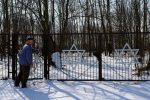 |
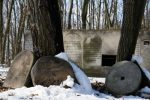 |
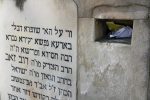 |
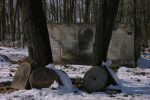 |
Not far from Kock there is a grave of Berek Joselewicz, who was killed in the battle of Kock in 1809. Berek Joselewicz served in the Dąbrowski Legions, and he fought in the successful offensive by the Duchy of Warsaw Army . Oskar Kolberg wrote about the event: "Here fell Berek, of old covenant - after a brave offensive against an overwhelming Austrian force. This circumstance is the origin of the saying: died like Berek at Kock (i.e. totally disappeared)." The gravestone, funded in 1909 by count Edward Żółtowski was engraved with: "Berek Joselewicz - Józef Berkowel Berkiewicz, born in Kretynga, Lithuania, in 1760. Colonel of the Polish Army, a squadron chief of the 5 th Cavalry Regiment of the Duchy of Warsaw. Knight of the Legion of Honor, and Virtuti Militari. Killed in the Battle of Kock, 1809. Buried here. . with his blood, he earned his fame.100 th anniversary of death. 1909." A second gravestone carries his first name, his last name, and dates of his birth and death. The history of the shtetl got disrupted by the Holocaust. On September 9 th , 1939, during an air raid over the town tzaddik Josef Morgenstern was killed. A ghetto was created in Kock, to which Jews from Lubartow, Suwalki, Serock, Nowy Dwor, and Radzyn Podlaski were being deported. The ghetto residents were murdered in Parczew and Treblinka, in 1942. To this day, a big part of the pre-war town structure remains - mostly houses that, until the war, used to be Jewish property. The house of tzadik, with its characteristic tower, survives at a juncture of Wojska Polskiego Street and Polna Street. The Kock Jewish cemetery is located outside of town, about half a mile from the town limits. The only way to drive there is on the dirt path. From the town square, down Hanka Sawicka Street, make a right at a shrine. A solid, metal fence with a lockable gate surrounds the cemetery. Mr. Roman Stasiak, who lives in a nearby house (to the right of the cemetery), is in charge of the cemetery. Mr. Stasiak is also the cemetery's custodian. |
|||
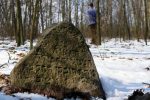 |
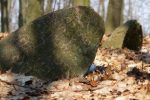 |
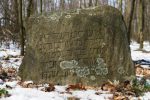 |
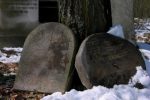 |
At the time of WWII, the cemetery was destroyed by the Nazis. The elder people of Kock say that a majority of gravestones were taken to Radzyn Podlaski, where they were broken and used for street hardening. In 1958 the government of Kock decided to afforest the territory of the cemetery. As a part of a social action, with the help of local students, many poplar trees (which grew very dense) were planted. |
|||
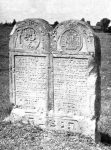 |
|||
Double matzevah of Mosze, son of Israel, and Rachel, daughter of Yehuda Photograph taken at the Kock cemetery after WWII. Source: The Kock Book of Memory |
|||
Not many mathzevas remain at the necropolis today. Still, for many pilgrims, the most important object at the cemetery is the ohel, where buried are: - Menachem Mendel of Kock (1787 - 1859), founder of the Kock Hasidic Dynasty; a teacher of Yitzchak Meir Rothenberg of Gora Kalwaria, among other students. - Benjamin Morgenstern, son of Menachem Mendel, son in law of Abraham Mordechai of Gora Kalwaria. Died in 1866, at the age of 26. - Dovid Morgenstern, son of Menachem Mendel. According to the known scholar of the history of Polish Jews, Marcin Wodzinski, he was "one of the most brilliant minds of his generation." Died in 1893. - Yaakov Yehoshua Morgenstern, son of Dovid. Rebbe since 1906. Died in 1907. - Dow Zeew Kohen Rappaport, son of Israel Kohen of Pinczow, son in law of Rebbe Menachem Mendel. Died in 1901. |
|||
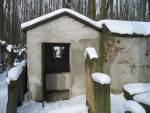 |
|||
| Ohel of Abraham Josef from Kock in the Jewish cemetery in Warsaw (photo: K. Bielawski) | |||
It is worth to know that in the Jewish cemetery in Warsaw at Okopowa street there is an ohel of Abraham Josef, grandson of Menachem Mendel; rabbi and from 1929 a tzaddik of Kock. text: Artur Cyruk, Krzysztof Bielawski Bibliography: |
|||
 |
|||
We look for information on Jews from Kock and their cemetery. We also wait for memories of people who remember the cemetery from the pre-war times. |
|||
| strona główna | cmentarze | warto wiedzieć | księga gości | napisz do nas |
